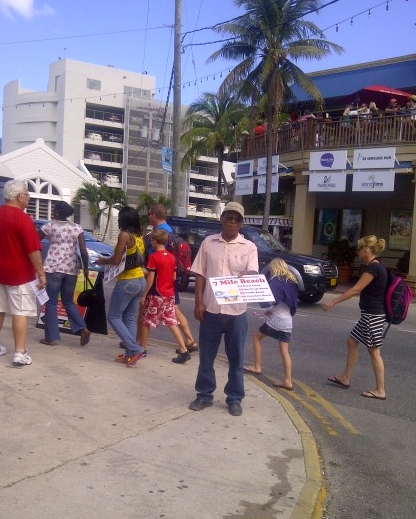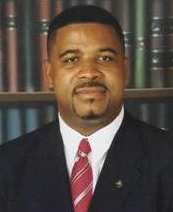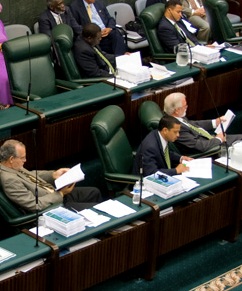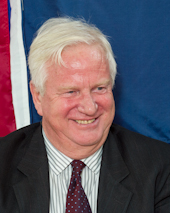Archive for December 7th, 2012

International NGO publishes global corruption list
 (CNS): With Denmark listed as the least corrupt nation in the world and Somalia the worst, there are few surprises about the rankings for this year’s corruption index published by Transparency International (TI), the global watchdog that monitors the world’s corruption levels, but the poor scores of more than two thirds of the world’s governments is of major concern it said. The NGO says it is clear that corruption is a major threat facing humanity as it translates into human suffering, the extortion of poor families for bribes to see doctors or access clean drinking water, and the derailment of building essential infrastructure while corrupt leaders skim funds.
(CNS): With Denmark listed as the least corrupt nation in the world and Somalia the worst, there are few surprises about the rankings for this year’s corruption index published by Transparency International (TI), the global watchdog that monitors the world’s corruption levels, but the poor scores of more than two thirds of the world’s governments is of major concern it said. The NGO says it is clear that corruption is a major threat facing humanity as it translates into human suffering, the extortion of poor families for bribes to see doctors or access clean drinking water, and the derailment of building essential infrastructure while corrupt leaders skim funds.
“Governments need to integrate anti-corruption actions into all aspects of decision-making,” TI stated in this year’s report released on Wednesday. “They must prioritise better rules on lobbying and political financing, make public spending and contracting more transparent, and make publicbodies more accountable. After a year with a global focus on corruption, we expected more governments to take a tougher stance against the abuse of power. The Corruption Perceptions Index results demonstrate that there are still many societies and governments that need to give a much higher priority to this issue.”
The index goes from 0, which indicates a country is perceived as highly corrupt, to 100, meaning it is perceived as very clean. Somalia, Korea and Afghinstan scored only 8 points, making them the most corrupt places in the world, while Denmark was joined by Finland and New Zealand, which also scored 90 points.
The Cayman Islands is not listed on the index as it is an overseas territory but the UK was ranked at number 17 with a score of 74 and considered one of the least corrupt countries in the world. Meanwhile, the US came in at 19th place out of 176 countries with 73 points.
Here in the Caribbean TI found that Barbados has the lowest perceived level of corruption, and ranked Barbados at 15th in the world, higher than both the UK and the US, and an improvement on its 16th place in last year’s list.
The Bahamas was the next-highest-rated country from the region, coming in at 22nd, tied with St Lucia and France. Haiti, not surprisingly, had the highest level of perceived corruption in the public sector, ranking 165th in the world and very close to the bottom.
However Jamaica made a minor improvement, sharing the 83rd spot with four other countries near the middle of the table with a score of 38 points. That was the island nation’s best ranking in five years — last year it was 87th in 2010, 99th in 2009 and 96th in 2008.
See full details of the Corruption Perceptions Index 2012 here.
Experts measure march of the green iguana
(CNS): Few people in Cayman are unaware of the negative impact that the invasion of green iguanas has had on the island and the spread of this prolific reptile is now the subject of a major study. The International Reptile Conservation Foundation has published an article that examines the devastating impact the march of the green iguana is having throughout the Caribbean and the Americas. With a 70% success rate for establishing new populations, the scientists found that if unimpeded the iguana will continue to grow and it advises countries that are not already plagued by the reptile to take protective precautions, including legislation. For those already invaded, immediate eradication to protect indigenous species, as in Cayman, was recommended.
The authors of the study stated that governments needed to plan accordingly to prevent the establishment of new iguana populations.
“Control of the Green Iguana invasion might best be undertaken by using a regional approach that encompasses the Greater Caribbean,” the article concludes. “Otherwise, the march of the Green Iguanas will continue and the negative genetic, ecological, environmental and economic effects currently associated with these beasts could soon affect the remainder of the region.”
See full article here.

Iillegal touting plagues local tour operators
 (CNS Business): Several of the drivers and tour operators who are following the Port Authority’s formal system at the cruise terminal in George Town to serve visiting tourist are becoming increasingly angry over the growing number of drivers who are illegally touting and undercutting fares. As competition for business gets tougher in the capital with the decline in cruise tourism, the tour operators and drivers say government has to do something to address the chaos that is developing at the terminals. Discussing an issue which has gone unresolved for years, one of the drivers told CNS that they believe the tourism ministry is ignoring the problem because of the difficult economic times. Read more on CNSBusiness
(CNS Business): Several of the drivers and tour operators who are following the Port Authority’s formal system at the cruise terminal in George Town to serve visiting tourist are becoming increasingly angry over the growing number of drivers who are illegally touting and undercutting fares. As competition for business gets tougher in the capital with the decline in cruise tourism, the tour operators and drivers say government has to do something to address the chaos that is developing at the terminals. Discussing an issue which has gone unresolved for years, one of the drivers told CNS that they believe the tourism ministry is ignoring the problem because of the difficult economic times. Read more on CNSBusiness

Court rejects Devon Anglin appeal
(CNS): The Cayman Islands Court of Appeal has dismissed the application by Devon Anglin to overturn his conviction of the murder of Carlos Webster in a West Bay Road nightclub. Anglin had appealed on the basis of irreconcilable differences and inconsistences in the evidence of the two anonymous witnesses and the grounds that the anonymous witness order should not have been made. Although the appeal court has not yet given the detailed reasons why they dismissed the appeal, the judgment will set an important precedent regarding the use of anonymous witnesses in future cases.
Check back to CNS later for more on this and other Court of Appeal hearings.

Michael Misick arrested
 (CNS): International fugitive and former premier of the Turks and Caicos’ Islands (TCI), Michael Misick, was arrested this morning (Friday 7 December) at the Santos Dumond airport in Rio de Janeiro by the Brazilian Federal Police. The TCI Special Investigation and Prosecution Team (SIPT) confirmed that he was arrested as result of an international arrest warrant issued by Interpol and a further warrant issued by Brazilian Supreme Court. Misick faces a number of serious charges relating to corruption and maladministration in TCI, a British Overseas Territory. His arrest was sought in relation to an ongoing investigation by the SIPT into issues arising from Sir Robin Auld’s 2008-09 Commission of Inquiry relating to alleged corruption and maladministration.
(CNS): International fugitive and former premier of the Turks and Caicos’ Islands (TCI), Michael Misick, was arrested this morning (Friday 7 December) at the Santos Dumond airport in Rio de Janeiro by the Brazilian Federal Police. The TCI Special Investigation and Prosecution Team (SIPT) confirmed that he was arrested as result of an international arrest warrant issued by Interpol and a further warrant issued by Brazilian Supreme Court. Misick faces a number of serious charges relating to corruption and maladministration in TCI, a British Overseas Territory. His arrest was sought in relation to an ongoing investigation by the SIPT into issues arising from Sir Robin Auld’s 2008-09 Commission of Inquiry relating to alleged corruption and maladministration.
In a release issued by the TCI Governor’s Office, the UK authorities said they were grateful to their Brazilian counterparts for their cooperation are now seeking Misick’s extradition to the Turks and Caicos Islands.
As the former premier was born in a British Overseas Territory he is receiving British consular assistance, the release stated, but added that no other comment or details would be given at this time.
In March this year Misick issued a statement saying that he had applied for political asylum from “another country”. Although it was not known where he was at the time or which country he had sought political asylum from, he claimed that he could not expect to get a fair hearing in his native country. Misick said he was being politically persecuted because of his plan to move the country towards independence and accused the UK interim government of changing laws in an attempt to convict him and his political colleagues and supporters.
At the time Misick described the investigation as a “set-up for a modern-day John Crow political lynching”, and said he would not be a part of it. “I have therefore sought protection from another country in accordance with the United Nations Convention on Human Rights and the human rights laws of that country, as it is my right to do and the right of any person that is being politically persecuted,” he stated. “I am not a fugitive, and will never be a fugitive. I have applied for political asylum from another country and I am merely seeking protection from political persecution.”
The UK suspended the TCI constitution in the wake of the Commission of Inquiry and imposed direct rule for three years. However, despite the investigations into alleged corruption by Misick and others in the Progressive National Party, of which he was leader, the PNP returned to power in the first elections following the restoration of the TCI constitution and democracy. PNP Leader Dr Rufus Ewing was sworn in as the new premier of the Turks and Caicos Islands on 13 November.

C4C seeks better ‘returns’ on MLA funding
 (CNS): Members of the Coalition for Cayman, a group describing itself as a political advocacy and awareness movement, have admitted funding MLAs in the past from both political parties but were disappointed with those politicians once they were elected to office. In response to comments made by the PPM leadership at a recent press briefing, the coalition released a short statement in which it said members had given money to people they thought would be independent thinkers but that this had turned out not to be the case. The group did not reveal which candidates that are now in office they had funded but made it clear that this time they want more from candidates that they help return to office.
(CNS): Members of the Coalition for Cayman, a group describing itself as a political advocacy and awareness movement, have admitted funding MLAs in the past from both political parties but were disappointed with those politicians once they were elected to office. In response to comments made by the PPM leadership at a recent press briefing, the coalition released a short statement in which it said members had given money to people they thought would be independent thinkers but that this had turned out not to be the case. The group did not reveal which candidates that are now in office they had funded but made it clear that this time they want more from candidates that they help return to office.
“We have previously contributed to individuals in both parties,” the C4C stated in response to accusations by the chairman of the PPM that the C4C was a group of wealthy individuals trying to buy government.
“Those individuals were people who we thought were independent thinkers, who would stand up for what is in the best interest of the country. We did this in hopes it would have led to a better Cayman. But sadly, due to the effect of partisan politics it has not. We have learned our lesson. Even independent thinkers in a party are stifled by party leaders who put party first. That is why we are looking for independent candidates with integrity and proven leadership qualities that will put the people of the country first,” C4C said.
Aside from not revealing which candidates had disappointed them, the group has still not indicated what policies it wants the candidates it intends to finance to promote or exactly what the group believes is needed to put "countryfirst".
Having formally launched more than one month ago, the group has not said whether it will be promoting a new economic pillar, increasing or decreasing taxes and fees, and if so, which ones. It has not stated if it supports the environmental law in its current format, where it stands on the ForCayman Investment Alliance, whether it will or will not support the landfill move, or any other pressing issues facing the country.
Given the collection of individuals that appear to be supporting the C4C, there is a wide diversity of opinion on what constitutes putting "country first". There are those who support the Dart deal as doing exactly that and some who are vehemently opposed and believe that stopping the deal would be putting country first. Some of the potential candidates have stated that environmental concerns are a priority and others who seem less concerned about that and more concerned about development.
Nevertheless, the group says that Independent leaders play a vital role in bringing about a balanced approach and holding the government accountable.It emphasised its intention to “endorse independent candidates and leaders who are committed to working together in the best interest of the country and our people,” but it did not explain how that will happen if their candidates hold opposing views on critical issues.
Answering criticisms from the PPM leadership that they had done nothing about governance issues over the last ten years, while corruption crept into the political arena, C4C said many of its executive members had and still serve the country on numerous boards at the request of both parties.
Still blaming the party system rather than politicians, the group stated that the system had become a partisan dictatorship, which had led to a decade of overspending and unprecedented debt.
“The Coalition for Cayman is committed to endorsing fiscally-responsible, proven, accountable leadership to provide government services without risking further financial burden on citizens and businesses,” it said, as it asked people to join the C4C.
See statement below.

No sign of Mac travel FOI
 (CNS): More than two months after CNS submitted a freedom of information request for the details and costs of the premier’s overseas trips for the last 12 months, there is still no sign of the information and the ministry has shown a blatant disregard for the Freedom of Information Law. The request was submitted on 5 October but the ministry has completely ignored due process by missing the 30 day deadline and did not request an extension until some three weeks after the statutory time limit had passed. The information manager (IM) then missed the 30 day extension and has now stated that the ministry cannot supply the details until 21 December.
(CNS): More than two months after CNS submitted a freedom of information request for the details and costs of the premier’s overseas trips for the last 12 months, there is still no sign of the information and the ministry has shown a blatant disregard for the Freedom of Information Law. The request was submitted on 5 October but the ministry has completely ignored due process by missing the 30 day deadline and did not request an extension until some three weeks after the statutory time limit had passed. The information manager (IM) then missed the 30 day extension and has now stated that the ministry cannot supply the details until 21 December.
It is not clear why the premier’s ministry of finance, tourism and development, which has three IMs, is having such a problem finding out where the premier has been, with whom, why and what he spent on travel over the last twelve months, but in her request on Thursday for even more time, Judy Powery, one the information managers, pointed to the accounts department as the place where things were being held up.
In a response to yet another email from CNS asking what had happened to the request she wrote:
“I had the opportunity to discuss this matter yesterday with our accounts department and they are about 75% completed, however, due to the in-depth details you are requesting they require more time to break-down the costs into the various categories. In light of this, I would appreciate if you could agree to an additional two weeks which would allow us sufficient time to fully complete the request,” Powery stated, adding that she hoped to have the information to CNS by 21 December.
Given the date of the original request, even if the ministry was able to meet its own new deadline, which CNS has not accepted, that would be a whopping 77 days compared to the 30 set out in the law.
In the same week CNS also made a request to the deputy premier’s ministry for similar information and the IM there was able to supply details of their minister’s trips, for the entire three years of the UDP administration, within 41 days. The IM had requested theextra time before the original deadline had passed and was able to supply the information in full.
As the premier’s ministry has completely ignored the law, and with no guarantees that officials will be able to supply this information before Christmas, CNS has now asked the ICO to step in and formally deal with the request.
The premier’s trips abroad have become of significant public interest and the ICO has indicated to all information managers that this is the kind of information that is likely to be regularly requested regarding all government officials, so it should be properly recorded, making it easy to respond to the requests.
However, it appears that no one is properly collating the details of the premier’s whereabouts and why. As a result, the ministry is having to track back through the year to check the numerous trips that McKeeva Bush has taken around the world, why he went, who he went with and how much the travel cost the public purse.
According to the response on the FOI request from the deputy premier’s ministry, Juliana O’Connor Connolly spent more than CI$213,000 on travelling over the three years since she took office. Sources have told CNS that the premier has spent much more than that this year alone. But with no sign of the response to the CNS freedom of information request, speculation that Bush has spent a record sum on overseas trips this year cannot be confirmed.
Related article:

PPM chair fears split vote
 (CNS): Anyone voting for independent candidates in the multi-member constituencies will be aiding the return of “Bush rule”, according to the chairman of the People’s Progressive Movement. Anton Duckworth said that voters who are dissatisfied with the current administration may think that a vote for an independent will help to remove McKeeva Bush from office because they are not voting directly for a UDP member, but they are mistaken. A vote for a member of the new Coalition For Cayman would not be a vote for change but a vote for, rather than against, the incumbent administration, Duckworth said, and pointed to the danger of splitting the vote. (Photo by Dennie Warren Jr)
(CNS): Anyone voting for independent candidates in the multi-member constituencies will be aiding the return of “Bush rule”, according to the chairman of the People’s Progressive Movement. Anton Duckworth said that voters who are dissatisfied with the current administration may think that a vote for an independent will help to remove McKeeva Bush from office because they are not voting directly for a UDP member, but they are mistaken. A vote for a member of the new Coalition For Cayman would not be a vote for change but a vote for, rather than against, the incumbent administration, Duckworth said, and pointed to the danger of splitting the vote. (Photo by Dennie Warren Jr)
Starting direct campaigning early, he urged everyone who wanted to see a change in government to choose PPM candidates if they are voting in George Town, Bodden Town or West Bay. Duckworth said that in the larger districts the independents would not be returned and people voting for them hoping to create a coalition government would merely succeed in “splitting the anti-Bush vote”, making it more, not less, likely that the UDP would form the next government.
Duckworth further suggested that, despite its claims, the C4C was a political grouping — but its name was irrelevant. Many for those propping up the group were disgruntled former UDP supporters who were disappointed that they could not control Bush once he was returned to office and they were now seeking new political representatives to use their wealth to control.
But, he said, the special interest groups should have been aware that Bush does as pleases and neither they nor the UDP could control the premier. It was this type of politics — the patronage of trying to buy favours in government — which had led to the perceptions of corruption and poor government that was causing untold damage to Cayman’s economy and its reputation abroad. That was the problem, not party politics, he said.
“It appears to me that the C4C group are trying to use their money to engineer a government … which they can influence and control,” Anton Duckworth said during a press meeting held by the Progressives' political party on Wednesday. “That’s the bad old game of money buying power.” It was a game that the PPM will not play, he added.
The party chair said there was a world of difference between the PPM and the UDP and it was misleading to blame a political system and not the politicians. He pointed out that the entire birth of the PPM was about creating a new kind of politics based on honesty and integrity and not patronage.
Listing a number of differences between the previous administration compared to the current UDP, he pointed to the passage of the Freedom of Information Law, the modernisation of the constitution, regular press briefings and the general openness and transparency of the party, as well as the decline in the levels of fear over repercussions and the lack of even a hint of corruption surrounding the four years the PPM were in office.
Party politics was not to blame for the numerous ills the country now faced, Duckworth said, but instead the system supplied a platform of like-minded individuals committed and already prepared to form a government without the need for horse-trading, the compromising of principles or the dominance of one person, as had occurred with “Bush rule”.
“People need to demand far more from government,” Duckworth said. “This was one of many reasons why the PPM came together under the leadership of Kurt Tibbetts, to deliver better government with integrity.”
Given the system of government that Cayman follows, even if the party system was abandoned, once a group of people was elected they would be forced to come together as a group to form a government, which would then be bound in any event by collective responsibility.
He said that the major difference between the PPM and the UDP, as well as the new C4C, was that the PPM was a low-budget grassroots, people-oriented party that was not supported by money from big business or special interest groups. He said the purse strings of the PPM were not held by wealthy people behind closed doors or specific businesses using their money to promote their agendas via government.
Duckworth described the C4C as being funded by a small group of wealthy people who, after their disappointment with Bush, were seeking to control government through other means. He accused them of attempting to cash in on the popular suspicion about political parties when the concept of party was not the issue.
The chairman pointed out that most people across the country agreed that the issue was "Bush rule”, which had to be stopped. On election day, he said, voters should not be concerned about whether people were a political party or not but who collectively can give Cayman better government.